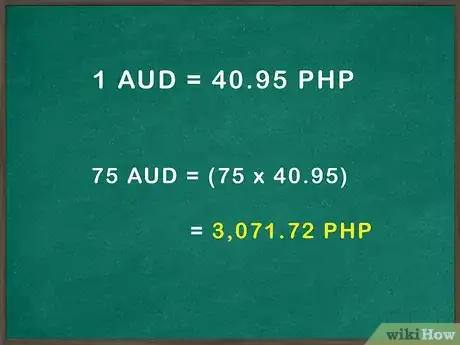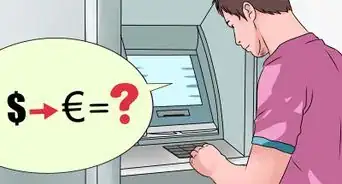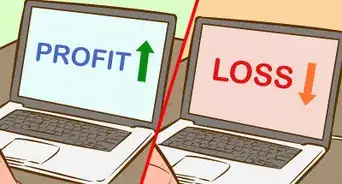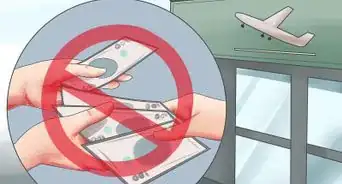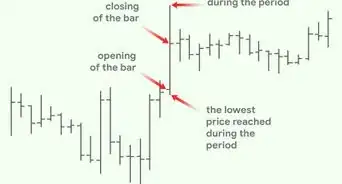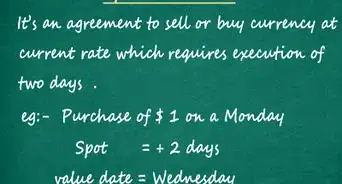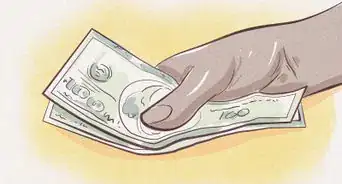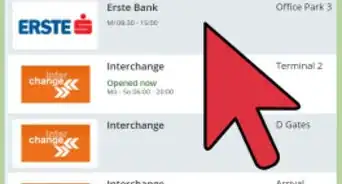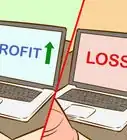This article was co-authored by wikiHow Staff. Our trained team of editors and researchers validate articles for accuracy and comprehensiveness. wikiHow's Content Management Team carefully monitors the work from our editorial staff to ensure that each article is backed by trusted research and meets our high quality standards.
This article has been viewed 113,966 times.
Learn more...
If you’re traveling to a nation like the United States from a country that uses pesos, you’ll need to convert your cash into the local currency. Thankfully, doing this is fairly easy once you know how financial conversion rates work and where you need to go to exchange your money.
Steps
Calculating Conversion Amounts
-
1Check the current currency conversion rate online. Like stocks, currency values change multiple times every day. As such, to find out how much your pesos are worth, you’ll need to look up the current currency conversion rate between the country your pesos are from and the national currency you’re converting them to.[1]
- You can look up conversion rates on websites like http://x-rates.com/ and http://xe.com/.
- Currency conversion rates are 6-digit numbers that contain 1 decimal point. For example, the current Chilean peso to Canadian dollar conversion rate may be 0.78866, 18.6855, or 2839.00.
- Economists list conversion rates in the format “COUNTRY 1/COUNTRY 2.” So, if you were searching for the Mexican pesos to US dollars conversion rate, you’d look for the initialism MXN/USD.
-
2Multiply your pesos by the conversion rate to find their dollar value. To find out how many dollars your pesos are worth, multiply your total peso amount by the currency’s current conversion rate. Then, round the resulting number.[2]
- For example: If you have 40 Mexican pesos and their conversion rate to US dollars is 0.05355, then you’d multiply 40 by 0.05355 to get 2.142. Once you have this number, round it down for a total of $2.14.
Advertisement -
3Use the inverse conversion rate to find the peso value of a dollar amount. In addition to a currency’s standard conversion rate, many websites offer a number known as an inverse conversion rate. If you multiply a specific dollar amount by this number, you can find out how many pesos it will take to get that amount via currency exchange.
- For example: If you want to get 75 Australian dollars and their inverse conversion rate to Philippine pesos is 40.8709, then you’d multiply 75 by 40.8709 to get 3065.317. After finding this number, round up for a total of ₱3065.32.
-
4Utilize a currency calculator to make the process easier. Converting a single peso amount into dollars is fairly straightforward. However, if you’re making lots of conversions, consider using an online currency calculator. Doing so will make the entire process far quicker and simpler.
- You can find currency calculators on most conversion rate websites, as well as specialty calculator-only pages like https://coinmill.com/.
-
5Expect slightly different rates when exchanging your money. Though converting your pesos into dollars will give you a solid estimate of how much your money is worth, you will rarely receive that much when exchanging it for real. This is for 2 major reasons:[3]
- Currency conversion rates change so frequently that high rates often come down in a matter of minutes.
- Banks and other places that exchange currencies usually charge a fee for the services.
Exchanging Pesos for Dollars
-
1Use a credit or debit card for easy transactions. If you’re visiting a fairly developed country, such as the United States, the easiest way to exchange your money is by acquiring a travel credit or debit card. When using 1 of these cards, your bank will automatically convert your funds during the transaction, taking the hassle out of currency exchange.[4]
- Most banks will let you use your standard credit or debit card while abroad, though they may charge additional fees for the privilege.
- Keep in mind that some businesses, especially those in less-developed countries, may only accept cash from foreign travelers.
- Make sure to contact your bank before leaving so they don’t freeze your card during the trip.
-
2Exchange money at an ATM for quick cash. Similar to credit and debit card transactions, ATMs use your bank’s current conversion rate to exchange your money instantaneously. However, be aware that many ATMs charge an additional fee for this service.[5]
- When possible, withdraw money in large amounts to minimize the amount of fees you have to pay.
-
3Order money from your bank for better exchange rates. If you have an account with a large or international bank, check to see if they offer a currency exchange service. If they do, you can order dollars from them prior to your trip.[6]
- Though the money may take some time to get to you, the exchange rates are usually a little better than those used for things like credit card transactions and ATM withdrawals.
- Most banks will let you order money in person, online, or by phone.
- Be aware that some banks charge a processing and, in some cases, delivery fee for this service.
-
4Purchase traveler’s checks if you’re going to a rural area. A traveler’s check is a form of prepaid currency that serves as a stand-in for your cash. If you’re going to an underdeveloped area where ATMs and credit card machines are scarce, these checks will give you an easy way to exchange money without having to carry lots of pesos.[7]
- You can purchase traveler’s checks at your bank. When you arrive at your destination, you can exchange them for dollars at most local financial institutions.
- If your traveler’s checks are stolen, call your bank’s customer service hotline to request replacements.
-
5Visit a currency house to exchange money at your destination. In most places, you can exchange your pesos at currency houses run by businesses like Travelex and the International Currency Exchange. Though these organizations typically charge higher fees than your bank, they’re often far more convenient to use when you’re in a foreign country.[8]
- Many hotels and public transit stations also offer currency exchange services, though keep in mind that their fees may be even higher.
Community Q&A
-
QuestionIs it better to tip in USD or pesos?
 wikiHow Staff EditorThis answer was written by one of our trained team of researchers who validated it for accuracy and comprehensiveness.
wikiHow Staff EditorThis answer was written by one of our trained team of researchers who validated it for accuracy and comprehensiveness.
Staff Answer wikiHow Staff EditorStaff AnswerYou can do either, but if you tip in dollars, use paper rather than coins. In general, it’s easier for the recipient of the tip if you use their local currency, so that they don’t have to go get it exchanged.
wikiHow Staff EditorStaff AnswerYou can do either, but if you tip in dollars, use paper rather than coins. In general, it’s easier for the recipient of the tip if you use their local currency, so that they don’t have to go get it exchanged. -
QuestionIs $100 a lot of money in Mexico?
 wikiHow Staff EditorThis answer was written by one of our trained team of researchers who validated it for accuracy and comprehensiveness.
wikiHow Staff EditorThis answer was written by one of our trained team of researchers who validated it for accuracy and comprehensiveness.
Staff Answer wikiHow Staff EditorStaff Answer$100 USD is worth about a week’s wages for an average worker in Mexico. You can stretch $100 pretty far as a tourist—for example, it’s enough to pay for a night at many all-inclusive resorts.
wikiHow Staff EditorStaff Answer$100 USD is worth about a week’s wages for an average worker in Mexico. You can stretch $100 pretty far as a tourist—for example, it’s enough to pay for a night at many all-inclusive resorts. -
QuestionIs 3000 pesos a lot of money in Mexico?
 wikiHow Staff EditorThis answer was written by one of our trained team of researchers who validated it for accuracy and comprehensiveness.
wikiHow Staff EditorThis answer was written by one of our trained team of researchers who validated it for accuracy and comprehensiveness.
Staff Answer wikiHow Staff EditorStaff AnswerAs of June 2020, 3000 Mexican pesos is worth a little over $130 USD. You can buy a fair bit for that amount of money in Mexico. For instance, as a tourist, you could purchase a night at a resort, buy a round of drinks for the whole bar, or dine out with a few friends at a nice restaurant.
wikiHow Staff EditorStaff AnswerAs of June 2020, 3000 Mexican pesos is worth a little over $130 USD. You can buy a fair bit for that amount of money in Mexico. For instance, as a tourist, you could purchase a night at a resort, buy a round of drinks for the whole bar, or dine out with a few friends at a nice restaurant.
References
- ↑ https://www.investopedia.com/articles/forex/090314/how-calculate-exchange-rate.asp
- ↑ https://www.mathsisfun.com/activity/currencies.html
- ↑ https://www.investopedia.com/articles/forex/090314/how-calculate-exchange-rate.asp
- ↑ https://www.cntraveler.com/story/where-to-exchange-currencyand-how-to-be-smart-about-it
- ↑ https://www.cntraveler.com/story/where-to-exchange-currencyand-how-to-be-smart-about-it
- ↑ http://www.nbcnews.com/id/41282577/ns/travel-travel_tips/t/traveling-abroad-how-exchange-currency/#.WpSpUudMFhF
- ↑ http://www.nbcnews.com/id/41282577/ns/travel-travel_tips/t/traveling-abroad-how-exchange-currency/#.WpSpUudMFhF
- ↑ https://www.cntraveler.com/story/where-to-exchange-currencyand-how-to-be-smart-about-it
About This Article
To convert pesos into dollars, first look up the currency conversion rate between the country your pesos are from and the national currency you’re converting them to. Then, multiply your peso amount by this conversion rate and round the result to get your conversion total. If you want to find out how many pesos it would take to get a predetermined dollar amount, multiply the dollar total by your currency’s inverse conversion rate and round the result. To learn how to exchange your pesos at banks, currency houses, and other places, scroll down!


